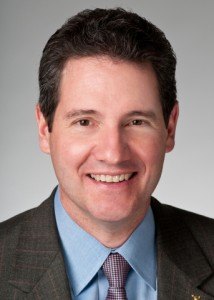
Hartford Financial Services Group Inc. promoted Christopher Swift to chief executive officer, replacing Liam McGee, who repaid the insurer’s bailout and is stepping down after a medical procedure.
Swift, 53, the chief financial officer who joined from American International Group Inc. in 2010, becomes CEO on July 1, according to a statement today from Hartford, which is based in the Connecticut city of the same name. McGee, 59, will remain executive chairman until the next annual shareholders meeting.
McGee, a former executive at Bank of America Corp. took over Hartford in 2009 and repaid a $3.4 billion government rescue the next year. He also sold a U.S life insurer, a Japan annuity business and a retirement-plans operation as he narrowed the company’s focus to property-casualty coverage. Hartford said in January 2013, that he was having chemotherapy after the removal of a brain tumor.
Stepping down as CEO will allow McGee to devote “additional time to continued recovery from a recent procedure related to my previously disclosed health issue,” he said in the statement. “With our strategic transformation largely complete, it is the right time for the company and me personally to make this transition.”
Hartford has gained 37 percent since the last trading day before McGee became CEO on Oct. 1, 2009.
Beth Bombara, 46, is overseeing the businesses that Hartford is winding down, will replace Swift as CFO. Doug Elliot, 53, president of commercial markets, will take the title president, a duty that is currently held by McGee.
‘Remain Focused’
Swift was CFO of AIG’s American Life Insurance Co. before joining Hartford. He started his career as an auditor in the Chicago office of KPMG and later became executive vice president of Conning Asset Management.
“I want to thank Liam for his leadership,” Swift said in the statement. “We will remain focused on executing our strategy to deliver greater shareholder value by profitably growing our property & casualty, group benefits and mutual funds businesses, reducing the size and risk of our legacy annuity block and becoming a more effective and efficient organization.”





















 What Analysts Are Saying About the 2026 P/C Insurance Market
What Analysts Are Saying About the 2026 P/C Insurance Market  Modern Underwriting Technology: Decisive Steps to Successful Implementation
Modern Underwriting Technology: Decisive Steps to Successful Implementation  Flood Risk Misconceptions Drive Underinsurance: Chubb
Flood Risk Misconceptions Drive Underinsurance: Chubb  AIG, Chubb Can’t Use ‘Bump-Up’ Provision in D&O Policy to Avoid Coverage
AIG, Chubb Can’t Use ‘Bump-Up’ Provision in D&O Policy to Avoid Coverage 









